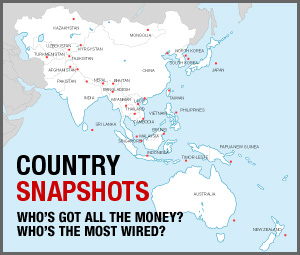
North Korea
What will North Korea look like in the future? And what major issues will it face in 2020? All will depend on whether leader Kim Jong-Il is still around then. The ‘dear’ leader (now aged 68) reportedly collapsed from a stroke in August 2008. While he has apparently recovered, it is far from clear if he’ll live until the end of the decade. If Kim survives and is in good health, he’ll continue to play the survival game, putting the interest of regime survival above all others.
The DPRK continues to enforce ‘military first politics’ (Seongun Jeongchi) and the military remains loyal to Kim. North Korea’s professed goal of a ‘strong and prosperous country’ (Gangseong Daeguk) remains elusive even with nuclear weapons in its possession.
With the rogue state now possessing additional nuclear warheads and better ICBMs (Daepodong-2 missiles), Kim Jong-Il seems at present to have no intention of parting with his nuclear weapons. Rather, he seems to be seeking to use them as his diplomatic trump card with the United States if North Korea resumes with the Six-Party negotiations aimed at freezing and dismantling its nuclear facilities and materials in exchange for political, security and economic gain. In the meantime, the US refuses to grant political and economic favours to North Korea and will continue to strongly oppose the country’s nuclear and missile proliferation efforts. Such tensions on the Korean peninsula will also persist but are manageable. Meanwhile, though, the numbers of North Korean refugees fleeing the country are projected to increase.
Kim Jong-Un (aged 27), the dear leader’s youngest son, is being groomed to succeed his father. But without credentials and still young, he’s not accepted by North Koreans as the next leader. If North Korea sticks to the economic principles of socialism, the economy will continue to stagnate and deteriorate, with China remaining the regime’s most important aid donor and political supporter. This leaves South Korea to maintain economic cooperation and personnel exchanges on a limited scale. Russia has continued to stay mostly on the sidelines, having no significant impact on the Korean question and will most likely continue on this path. In short, there will likely be no substantive changes to North Korea’s regime except the growing discontent and frustration of its population that will continue to simmer beneath the seemingly calm surface.
But, what if Kim Jong-Il dies suddenly, as his father Kim Il-Sung did in 1994? Then, all bets are off. North Korea might quickly implode with foreign powers threatening to intervene. Eventually, though, South Korea would likely absorb the North and the two Koreas would become one.
Seung-Ho Joo is Professor of Political Science at the University of Minnesota, Morris.










